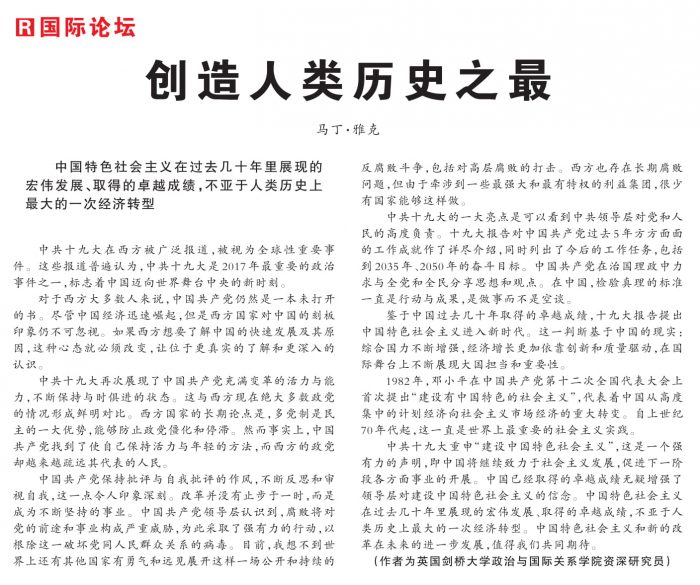The following piece featured in People’s Daily, 9th January 2018.

The following piece featured in People’s Daily, 9th January 2018.

The following is an English translation of an article by Martin Jacques that appeared in the People’s Daily, 22nd December 2017.
At the end of 2017 uncertainty dominates the outlook for the future. As we can now see with great clarity, the Western financial crisis of 2007-8 proved the most important turning point in the West since 1945. For a decade, the Western economies have been mired in varying degrees of stagnation, not least with regard to living standards. And it was the Great Recession that begat the Great Populist Uprising in 2016. The latter signalled the end of the hegemony of neo-liberalism in the West, which began in 1980 with the arrival of Reagan and Thatcher and was characterised by hyper-globalisation, privatisation and a huge growth in inequality. The Uprising was driven by large swathes of the population in both the United States and Britain whose living standards had more or less stagnated for four decades. It was a popular revolt against the governing elites by those who felt left behind and who held these elites responsible for their deteriorating situation. Politically the new mood was articulated most clearly, though not solely, by the right, notably Trump in America and the Brexiteers in the UK.
我们应当铭记,2017年始于习近平主席在瑞士达沃斯世界经济论坛上的演讲。这一演讲的主要观点迅速传遍世界,并被视为对经济全球化的标准界定,将之称为新的全球共识也毫不为过
这是一个充满不确定性的时代。但有一点很明确,对西方而言,2007—2008年爆发的国际金融危机是自1945年以来的一个重大拐点。10年间,西方国家陷入了不同程度的停滞,尤其是在人民生活水平方面。这次大衰退最终导致了2016年西方民粹主义的兴起。民粹主义泛滥标志着始于上世纪80年代、以自由放任的全球化、私有化和收入差距拉大为特征的西方新自由主义支配地位的终结。